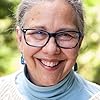Ask the Author: Carlene Hill Byron
“I'll be answering questions about "Not Quite Fine" on Tuesdays in September. Ask what’s on your mind!”
Carlene Hill Byron
Answered Questions (3)
Sort By:

An error occurred while sorting questions for author Carlene Hill Byron.
Carlene Hill Byron
I learned from the first article I was ever assigned to write (way back in 1980, for the Boston Phoenix's arts section) that the average published author at that time was earning less than $5K per year from their books. That's about $14K in 2021 dollars. Not a living by any stretch!!
Today, income from books and other writing is much lower -- ballpark $3.5K on average for published authors. There's lots that goes into that decline, but it makes me glad I decided to build my career around writing-as-a-tool instead of writing-as-a-focus. I'm happy to be sharing some ideas about a passion in my first book, Not Quite Fine. And I'm happy I'm not relying on the book for my retirement income!
Today, income from books and other writing is much lower -- ballpark $3.5K on average for published authors. There's lots that goes into that decline, but it makes me glad I decided to build my career around writing-as-a-tool instead of writing-as-a-focus. I'm happy to be sharing some ideas about a passion in my first book, Not Quite Fine. And I'm happy I'm not relying on the book for my retirement income!
Carlene Hill Byron
1. Schedule time at the desk. 2. Allow myself a fairly wild and random writing strategy, where I freewrite endlessly on the assumption I'll throw most of it out. 3. Create idea patches on my whiteboard with multicolor stickers, so I can (wildly and randomly) grab some concept to write on today, then figure out later if it fits and where.
Carlene Hill Byron
Believe it or not, the idea came from my publisher! We were talking about a different topic and the acquisition editor suggested I consider writing about mental health, where I volunteered for a decade and have more than 40 years of lived experience as a person in treatment for her diagnosis.
The overall shape of the book fell into place pretty quickly. I wanted to address several cultural changes that have made mental health worse (in the US and other high-income nations). I wanted to consider changes in how the profession defines "normal" mental health that have made attaining "normal" increasingly unlikely.
At the same time, I wanted to recognize that faith communities have great resources to support individuals in attaining and maintaining our own best mental health. Key among these are ways that faith communities can help people experience meaning, belonging, purpose, value and hope in our lives.
Given that the US CDC says half of us will experience a "mental illness" in our lifetime, the congregation that develops its expertise in these supportive tools is preparing to serve half the population. I firmly believe these benefit everyone, because all people need meaning, belonging, purpose, value and hope.
I hope this book will allow people of faith to discover new confidence in their ability to support those of us who live with mental illnesses. The most important skills are the same ones that allow them to encourage and strengthen everyone else they know.
The overall shape of the book fell into place pretty quickly. I wanted to address several cultural changes that have made mental health worse (in the US and other high-income nations). I wanted to consider changes in how the profession defines "normal" mental health that have made attaining "normal" increasingly unlikely.
At the same time, I wanted to recognize that faith communities have great resources to support individuals in attaining and maintaining our own best mental health. Key among these are ways that faith communities can help people experience meaning, belonging, purpose, value and hope in our lives.
Given that the US CDC says half of us will experience a "mental illness" in our lifetime, the congregation that develops its expertise in these supportive tools is preparing to serve half the population. I firmly believe these benefit everyone, because all people need meaning, belonging, purpose, value and hope.
I hope this book will allow people of faith to discover new confidence in their ability to support those of us who live with mental illnesses. The most important skills are the same ones that allow them to encourage and strengthen everyone else they know.
About Goodreads Q&A
Ask and answer questions about books!
You can pose questions to the Goodreads community with Reader Q&A, or ask your favorite author a question with Ask the Author.
See Featured Authors Answering Questions
Learn more

